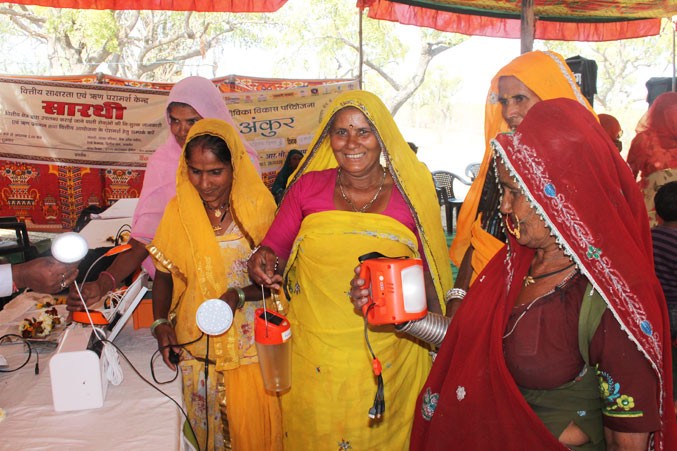
December 2016—It’s always good to have a friend in high places. Just ask the women from rural villages in Rajasthan state, India. Their friend is the sun.
Grouped in a network called Solar Sahelis (Solar Friends), these women form an innovative social enterprise that promotes renewable energy products such as solar-powered lamps and household appliances to communities living in hard-to-reach areas. Around 10 million households—half the homes in Rajasthan—have no electricity at all or unreliable grid power. Alternate sources of power, such as solar systems, are important as they provide basic electric light and power and are cheaper and safer than the kerosene and dry cell batteries currently used in households that lack a reliable electricity supply.
“We are extremely happy and will continue our services for income generation and for changing energy realities in our villages,” says Guddi Thakur, a Solar Saheli. “It feels great to be a part of this network and economically independent.”
Solar Sahelis is part of Frontier Markets, a social enterprise founded in 2011 by Ajaita Shah, who turned the business into a leading clean energy marketing, sales and distribution firm. She created a unique distribution model by using a network of trained women to be the face of the firm’s marketing and after-sales service. Shah has been recognized by the Ashden Award, the L’Oreal Women of Worth Award, and Forbes magazine’s 30 Under 30 social entrepreneur award.
Rajasthan, located in northwestern India, is an ideal choice for such solar initiatives as it remains sunny most days of the year. The desert zones in its western parts, which include Barmer, Bikaner, Jaisalmer and Jodhpur districts, receive radiation of 6 to 7 kilowatts per square meter per day and have vast flat and unused land. With these critical resources, the hotbeds of the Thar Desert have always possessed the highest potential for solar energy and appliances.
The USAID Private Financing Advisory Network-Asia (USAID PFAN-Asia) helped Frontier Markets to secure investment from a European foundation. The project provided assistance in financial modeling, structuring the transaction in compliance with bank regulations on foreign direct investments, and helped in negotiations with new and existing investors.
“This new round of funding has enabled Frontier Markets to extend our outreach to rural communities with new products, providing an opportunity for local partnerships for businesses, women employment and additional training programs,” said Shah.
Frontier Markets serves low-income households in India and works with local NGOs and locally trained field staff to educate families, providing them access to affordable products and customer service with high social impact. The enterprise has sold over 130,000 clean energy products in 16 districts in Rajasthan, with plans to reach up to 5 million households in the next five years.
USAID PFAN-Asia, which runs from 2013 to 2018, helps companies pitch their projects to investors and improve their business plans. The program is working to allocate at least $700 million in funds directly or indirectly for clean energy investments that will avoid or reduce greenhouse gas emissions and increase access to more sustainable clean electricity. To date, USAID has assisted 38 companies to mobilize clean energy financing worth a total of $500 million. The program is also helping create self-sustaining, long-term access to regional clean energy financing.
LINKS
Follow @USAIDAsia, on Facebook, on Flickr, on YouTube







Comment
Make a general inquiry or suggest an improvement.